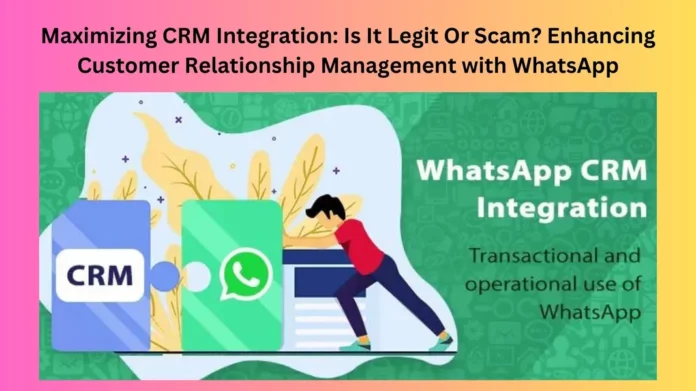In today’s digital age, customer relationship management (CRM) has evolved far beyond traditional methods. One powerful tool that has gained immense popularity in recent years is WhatsApp. This messaging app, initially designed for personal communication, has now become a vital tool for businesses to enhance their CRM efforts. In this article, we’ll explore how to maximize CRM integration by leveraging WhatsApp effectively.
The Power of CRM in Business
Before diving into WhatsApp’s potential, it’s crucial to understand the significance of CRM in the business landscape. CRM is not just a software but a strategy aimed at building strong, lasting relationships with customers. It helps businesses collect, organize, and analyze customer data to tailor their products or services, resulting in improved customer satisfaction and loyalty.
Why WhatsApp?
WhatsApp’s Ubiquity in Communication
WhatsApp boasts over 2 billion active users worldwide. Its widespread adoption makes it an ideal platform for businesses to connect with their customers.
Real-Time Interaction
WhatsApp offers instant messaging, enabling real-time communication with customers. This fosters quick responses to inquiries and issues, enhancing customer satisfaction.
Multimedia Communication
The platform supports various media types, including text, images, videos, and documents. This versatility allows businesses to share product information, tutorials, and visuals seamlessly.
Cost-Effective Communication
WhatsApp Business API provides cost-effective messaging solutions for businesses, making it more economical than traditional channels like SMS or phone calls.
Maximizing CRM Integration with WhatsApp
Now that we understand why WhatsApp is an excellent choice for CRM, let’s explore how to maximize its integration effectively.
Personalized Messaging
One of the key principles of CRM is personalization. With WhatsApp, you can send personalized messages to customers, addressing them by their names and tailoring content to their preferences. This fosters a sense of exclusivity and strengthens the customer relationship.
Automated Responses
WhatsApp’s chatbots allow for automated responses to common inquiries, ensuring that customers receive instant answers 24/7. This automation not only saves time but also enhances customer service efficiency.
Order Updates and Notifications
Businesses can use WhatsApp to provide customers with real-time order updates, delivery notifications, and tracking information. This transparency builds trust and satisfaction.
Feedback and Surveys
WhatsApp can be utilized to collect feedback and conduct surveys, enabling businesses to gain valuable insights into customer preferences and areas for improvement.
Customer Segmentation
Segmenting your customer base based on demographics, behavior, or purchase history allows for targeted messaging. WhatsApp facilitates this process, ensuring that the right messages reach the right customers.
Measuring Success
To ensure the effectiveness of your CRM integration with WhatsApp, it’s crucial to monitor key performance indicators (KPIs). Track metrics like response time, customer satisfaction ratings, conversion rates, and churn rates to gauge the impact of your efforts.
Conclusion
Incorporating WhatsApp into your CRM strategy is a powerful way to enhance customer relationships. Its real-time communication, personalization features, and cost-effectiveness make it a valuable tool for businesses looking to stay competitive in today’s digital world. By following best practices such as personalized messaging, automation, and customer segmentation, you can maximize the benefits of CRM integration with WhatsApp.
FAQs
FAQ 1: Is WhatsApp a secure platform for CRM integration?
Yes, WhatsApp offers end-to-end encryption for messages, ensuring the security of customer interactions. However, businesses should also follow best practices to safeguard customer data.
FAQ 2: Can WhatsApp Business API be integrated with existing CRM systems?
Yes, WhatsApp Business API can be integrated with various CRM systems, allowing businesses to streamline their customer data and communication channels.
FAQ 3: How can I ensure that my automated responses on WhatsApp are helpful and not robotic?
It’s essential to craft automated responses that sound natural and address common customer queries. Regularly review and update these responses to maintain a human touch.
FAQ 4: Are there any regulatory compliance issues to consider when using WhatsApp for CRM?
Yes, businesses should be aware of data protection and privacy regulations in their region when using WhatsApp for CRM. Ensure that you have the necessary permissions and comply with relevant laws.
FAQ 5: What are some common pitfalls to avoid when integrating WhatsApp into CRM?
Common mistakes include over-messaging, neglecting customer preferences, and not monitoring KPIs. It’s essential to strike a balance and continuously assess the effectiveness of your CRM integration.
By effectively integrating WhatsApp into your CRM strategy, you can strengthen customer relationships, improve satisfaction, and drive business growth in today’s competitive market. WhatsApp’s widespread popularity and versatile features make it a valuable asset for businesses looking to maximize their CRM efforts.















